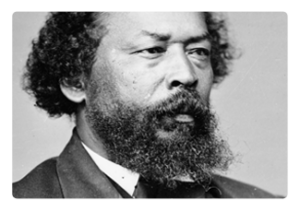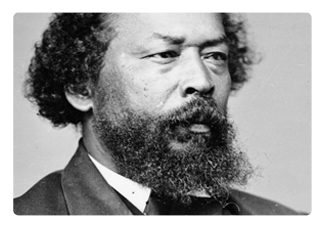
Benjamin Sterling Turner was born on March 17, 1825, in North Carolina to slave parents. At age 5 he was taken to Selma, Alabama with his mother. As a slave Turner was prohibited from receiving any formal education as a youth, but despite this major obstacle and others placed before him, he became an entrepreneur, business executive, civic leader, and legislator. In 1870 Turner became the first African American from Alabama elected to the United State Congress. Turner represented the State of Alabama from March 4, 1871 – March 3, 1873.
Turner was an ingenious man. Although Alabama law prohibited slaves from participating in any formal education classes and learning to read or write, by the time Turner was 20 he was an educated man able to read and write with ease. While still a slave, Turner managed the Saint James Hotel in Selma and ran a livery stable from which he kept a small portion of the earnings. Immediately following the end of the Civil War he began to purchase property and became a teacher, co-founding the first school in Selma for African American children.
In 1867 Turner turned toward politics and was elected tax collector of Dallas County and in 1869 Turner became the City of Selma’s first African American city councilor. In the 1870 Census Turner had reported assets of over $12,000, which made him one of the wealthiest African Americans in Alabama. Additionally, in 1870 Turner was unanimously nominated to be the Republican candidate from Alabama’s First Congressional District, which included Selma and a large portion of the Black Belt region in west-central Alabama. On November 8, 1870, Turner defeated Democrat Samuel J. Cummings to claim his seat in the Forty-second Congress of the United States.
While serving in the U.S. House of Representatives Turner sought financial aid for Alabama to rebuild the devastation caused by the War Between the States. He introduced bills to remove legal and political restrictions imposed on former Confederates and the elimination of the tax on cotton, arguing that the tax was unconstitutional because it singled out a specific cash crop. He also fought for reparations for former slaves and aid for impoverished black farmers.
In 1872 Turner made an unsuccessful bid for reelection to the Forty-third Congress. Two years later Turner purchased a 300-acre farm near Selma where he would pursue a career in agriculture many years later. Turner remained active in politics for several years following his defeat. He served as an election official for municipal elections in 1875, 1877, and 1891. He served as a delegate to the Republican National Convention in Chicago and as a republican presidential elector in the 1880 election. Turner ran and was elected for the second time to the Selma City Council in 1885. In early 1894 Turner suffered a stroke and died on March 21, 1894, in Selma, Alabama.


